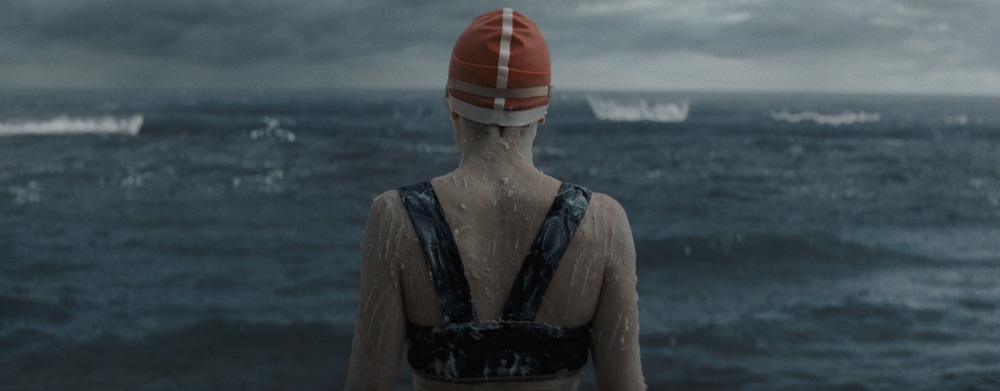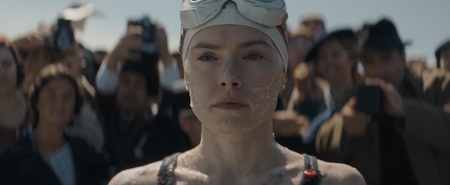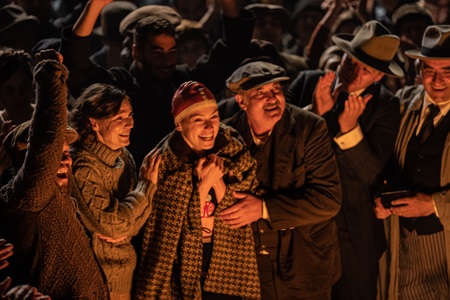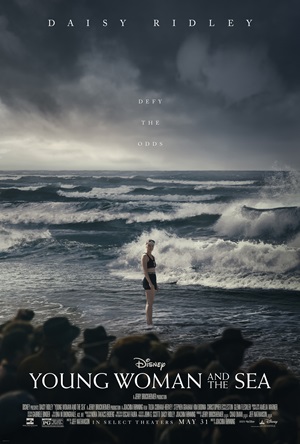
Inspiring Young Woman and the Sea Triumphantly Swims its Way into the Heart
Walt Disney Pictures has long been a sucker for an inspirational sports story, especially if it’s based on real-world events. For much of the 2000s, the studio churned out one winner (whether with audiences at the box office, with critics, or oftentimes both at the same time) after another. The Rookie. Miracle. Queen of Katwe. Remember the Titans. McFarland, USA. The Greatest Game Ever Played. Invincible. Glory Road. The list is positively endless.
But where in the pre-COVID days most of these titles could be counted on to turn a tidy profit, sell several DVDs, and have a long lifespan airing on Cable television over and over again, somewhere along the line Disney grew sour on the genre and became obsessed with producing a never-ending series of sequels, live-action adaptations of animated classics, Marvel adventures, and Star Wars installments instead. The mid-budget inspirational film, at least from a theatrical perspective, had gone the way of the dodo, at least as far as theatrical exhibition before being shuffled off to Disney+ by the studio was concerned.
All of this makes Young Woman and the Sea feel like something of a happy accident. Starring Daisy Ridley, produced by Jerry Bruckheimer, based on the best-selling book Young Woman and the Sea: How Trudy Ederle Conquered the English Channel and Inspired the World by Glenn Stout, with a script by Jeff Nathanson (Catch Me If You Can), and directed by Kon-Tiki filmmaker Joachim Rønning, this moving drama is an exhilarating old-school throwback. It’s a wonderful family-friendly adventure that deserves to be seen on the biggest screen possible, and the only disappointing element is how few will likely make the trek to the theater to see it.
Most of the action takes place in 1926. Defying all odds, young New Yorker Gertrude “Trudy” Ederle (Ridley) has become one of the world’s best female swimmers. But women in sports are seen as a curiosity, nothing more. No international sports body wants to give them funding. Even Trudy’s own father, Henry (Kim Bodnia), a German immigrant who runs the family’s neighborhood butcher shop, wants to see his daughter give up on her dreams. He’s even in the early stages of choosing a husband for her and planning Trudy’s wedding, much in the same way he did for her older sister, Margaret (Tilda Cobham-Hervey).
History already tells us what transpires next. Trudy stuck to her guns, goes to France, and trains to become the first woman to swim the English Channel. Her father comes around to rooting for his daughter’s success. Her older sister Margaret gives her added impetus to succeed. She even ends up getting mentored by the great Bill Burgess (Stephen Graham), the first man to swim the Channel in 1911. Suffice it to say that Trudy’s achievement changed the way the entire world viewed women’s athletics.
From a narrative standpoint, nothing here is surprising. As we already know the outcome, it’s then incumbent on Nathanson and Rønning to focus on the characters and their relationships more than they do the actual feat of remarkable strength and stamina Trudy will accomplish. This they do with aplomb.
While the swimmer’s interactions with her conservative father are important, a much greater and far more affecting emphasis is put on how Trudy interacts with all the various women in her life, most notably her elder sister Margaret. This is their story. While both become excellent swimmers, it is Trudy who ends up showcasing the type of talent that gives her a worldwide platform and allows her to find the interior fortitude to buck societal conventions. But Margaret never wavers in giving her sibling much-needed support. When working together, the pair are an unstoppable team, and I love that this subtly and confidently becomes the film’s undeniable center.
But the other women in Trudy’s life get their moment to shine as well. Sian Clifford is delightful as the athlete’s first swim coach Charlotte “Eppy” Epstein. She runs New York’s Women’s Swimming Association, teaching her students the 28-beats-per-minute American crawl. Even better is Jeanette Hain. She’s Trudy’s steadfast and headstrong mother Gertrud. There’s an entire sequence where she (and her son and son-in-law) burst into the NBC Radio studio and insist on sitting there silently to get all the news reports of her daughter’s efforts before they’re broadcast. These moments, as purposefully melodramatic as they may be, are enchantingly divine, and Hain’s splendid performance is a big reason why.
The technical aspects are aces across the board. Particularly outstanding is the masterful camerawork handled by veteran cinematographer Oscar Faura (The Orphanage) and the sweepingly grandiose score composed by Amelia Warner (Mary Shelley). The film’s sound design is also topnotch, while the digital visual effects are seamlessly integrated into the production and rarely call unnecessary attention to themselves.
Best of all is Ridley. This is the actor’s finest hour, her ruggedly plucky determination agreeably infectious. If Disney was willing to give this opus more than a cursory theatrical push, a little more marketing gusto, and wasn’t so determined to shuffle it off to their streaming platform sooner rather than later, I’d almost hold out hope Ridley could ride the wave of this film’s success to Oscar consideration later in the year. She’s that good.
Sadly, this will not be the case. Disney isn’t the same studio it was even less than a decade ago, and we should be thankful that a warmhearted adventure like Young Woman and the Sea is getting any sort of theatrical showcase at all, even if it is only a limited one. But no matter how audiences end up seeing this picture, I just hope they do, in fact, put forth the effort to do so. Trudy Ederle’s story needed to be told, and that it also happens to be this gosh darn triumphantly entertaining is a giant win for all of us.
Film Rating: 3 (out of 4)








